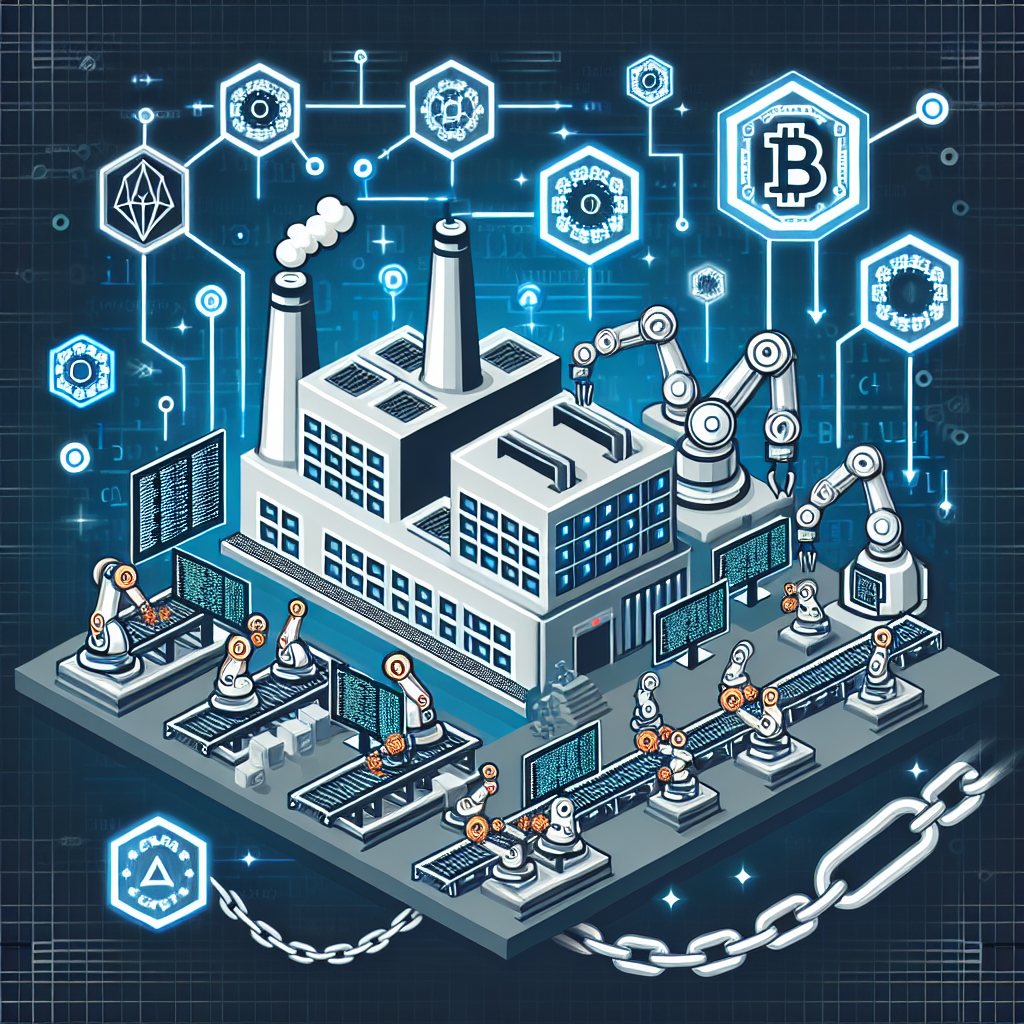In recent years, the integration of artificial intelligence (AI) and blockchain technology has been revolutionizing the manufacturing industry. These advanced technologies are offering new opportunities for businesses to streamline operations, improve efficiency, and enhance transparency in their supply chains. This article will explore how AI and blockchain are being integrated into manufacturing processes, the benefits they offer, and some frequently asked questions about this integration.
AI in Manufacturing:
Artificial intelligence is a powerful tool that is transforming the manufacturing industry. AI technologies, such as machine learning algorithms and neural networks, are being used to optimize production processes, improve product quality, and reduce costs. By analyzing vast amounts of data in real-time, AI systems can identify patterns and trends that humans may not be able to detect.
One of the key areas where AI is making a significant impact in manufacturing is predictive maintenance. By using AI algorithms to analyze sensor data from machinery, manufacturers can predict when equipment is likely to fail and proactively schedule maintenance before a breakdown occurs. This not only reduces downtime and maintenance costs but also extends the lifespan of machinery.
AI is also being used to optimize production scheduling and inventory management. By analyzing historical data and real-time information, AI systems can predict demand fluctuations, optimize production schedules, and ensure that the right amount of inventory is available at the right time. This helps manufacturers reduce waste, improve efficiency, and meet customer demand more effectively.
Blockchain in Manufacturing:
Blockchain technology is another game-changer in the manufacturing industry. Blockchain is a decentralized, secure, and transparent digital ledger that records transactions in a tamper-proof manner. By using blockchain technology, manufacturers can create a trusted and immutable record of every step in the supply chain, from raw material sourcing to product delivery.
One of the key benefits of blockchain in manufacturing is supply chain transparency. By recording every transaction on a blockchain, manufacturers can trace the origin of raw materials, track the movement of products through the supply chain, and verify the authenticity of products. This not only helps manufacturers comply with regulations but also builds trust with customers who are increasingly demanding transparency and accountability.
Blockchain technology also offers enhanced security and data integrity. By using cryptographic techniques and distributed ledger technology, blockchain ensures that data is secure, tamper-proof, and resistant to hacking. This is particularly important in industries where data privacy and intellectual property protection are critical.
Integration of AI and Blockchain in Manufacturing:
The integration of AI and blockchain in manufacturing is a powerful combination that offers even greater benefits than using each technology individually. By combining AI’s ability to analyze and make predictions with blockchain’s secure and transparent record-keeping, manufacturers can create a more efficient, transparent, and resilient supply chain.
One example of how AI and blockchain are being integrated in manufacturing is in quality control. By using AI algorithms to analyze data from sensors and cameras on the production line, manufacturers can quickly detect defects and anomalies in products. This information can then be recorded on a blockchain, creating a secure and transparent record of quality control checks.
Another example is in product traceability. By using AI to analyze data from sensors and RFID tags, manufacturers can track the movement of products through the supply chain in real-time. This information can then be recorded on a blockchain, creating a trusted and immutable record of every step in the production process.
Benefits of AI and Blockchain Integration in Manufacturing:
The integration of AI and blockchain in manufacturing offers a wide range of benefits, including:
– Improved efficiency: AI algorithms can optimize production processes, reduce downtime, and improve overall efficiency.
– Enhanced transparency: Blockchain technology creates a transparent and secure record of every transaction in the supply chain, improving traceability and accountability.
– Reduced costs: By predicting maintenance needs, optimizing production schedules, and reducing waste, manufacturers can lower operational costs.
– Enhanced security: Blockchain technology provides a secure and tamper-proof record of transactions, protecting data from hacking and unauthorized access.
– Better decision-making: AI algorithms can analyze vast amounts of data and provide insights that can help manufacturers make more informed decisions.
– Increased trust: By offering transparency and accountability, the integration of AI and blockchain can build trust with customers and partners.
FAQs about AI and Blockchain Integration in Manufacturing:
Q: How can AI help manufacturers improve quality control?
A: AI algorithms can analyze data from sensors and cameras on the production line to quickly detect defects and anomalies in products, improving quality control processes.
Q: How can blockchain technology enhance supply chain transparency in manufacturing?
A: By recording every transaction on a tamper-proof blockchain, manufacturers can trace the origin of raw materials, track the movement of products through the supply chain, and verify the authenticity of products.
Q: What are some examples of how AI and blockchain are being integrated in manufacturing?
A: AI and blockchain are being used in quality control, predictive maintenance, inventory management, product traceability, and other areas to improve efficiency, transparency, and security in manufacturing processes.
Q: How can manufacturers get started with integrating AI and blockchain in their operations?
A: Manufacturers can start by identifying areas in their operations where AI and blockchain can add value, conducting pilot projects to test the technologies, and working with technology partners to implement solutions tailored to their specific needs.
In conclusion, the integration of AI and blockchain in manufacturing is transforming the industry by improving efficiency, transparency, and security in supply chain processes. By using AI algorithms to analyze data and make predictions, and blockchain technology to create a secure and transparent record of transactions, manufacturers can create a more resilient and competitive supply chain. As more companies adopt these advanced technologies, the manufacturing industry is poised for a new era of innovation and growth.

